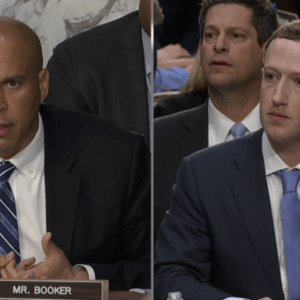Facebook Data Scandal Investigated by FTC: Remember Cambridge Analytica? That massive data breach that shook the world? This wasn’t just some minor glitch; it exposed millions of Facebook users’ personal information, sparking a major FTC investigation and forcing Facebook to confront its lax data security practices. We’re diving deep into the fallout, from the initial scandal to the hefty fines and lasting impact on how we view social media privacy.
The investigation unearthed a disturbing picture of how user data was harvested, weaponized, and ultimately misused. We’ll examine the key players, the legal battles, and the significant changes (or lack thereof) Facebook implemented to prevent future breaches. Get ready for a rollercoaster ride through the heart of one of the biggest tech scandals of our time.
The Cambridge Analytica Scandal

Source: entrepreneur.com
The Cambridge Analytica scandal, a major turning point in the public’s understanding of data privacy, involved the misuse of Facebook user data on a massive scale. This event significantly fueled the FTC investigation into Facebook’s data handling practices, revealing systemic vulnerabilities and ethical failures. The scandal highlighted the potential for political manipulation through sophisticated data analysis and targeted advertising, raising serious concerns about the impact of big data on democratic processes.
At its core, the scandal involved the unauthorized harvesting and use of Facebook user data by Cambridge Analytica, a British political consulting firm. This data was then allegedly used to micro-target voters during the 2016 US presidential election and the Brexit referendum, raising questions about the influence of data-driven manipulation on these pivotal events. The fallout resulted in significant regulatory scrutiny, legal battles, and a renewed global conversation about data privacy and the responsibility of social media platforms.
The Facebook data scandal, currently under FTC investigation, highlights the massive risks of unchecked data collection. This whole situation makes you wonder about the privacy implications of other tech giants, especially considering Apple’s recent revamp of Siri, as detailed in this article: apple give siri makeover. Ultimately, the Facebook case underscores the urgent need for stronger data protection regulations across the board.
Methods Used by Cambridge Analytica to Acquire and Utilize Facebook User Data
Cambridge Analytica employed a seemingly innocuous method to acquire vast amounts of Facebook user data. They partnered with Aleksandr Kogan, a Cambridge University researcher, who created a personality quiz app on Facebook. This app, while seemingly harmless, requested access to not only the users’ data but also the data of their friends, exploiting Facebook’s then-lax data sharing policies. Millions of users unwittingly granted access to their personal information and that of their networks, resulting in a massive data breach. This data, encompassing personal details, preferences, and relationships, was then allegedly used by Cambridge Analytica to create detailed psychological profiles of voters, enabling targeted advertising and manipulation of public opinion. The firm used sophisticated data analytics and psychographic profiling to craft personalized political messaging, aiming to influence voter behavior.
Violations of User Privacy and Data Protection Laws
The actions of both Facebook and Cambridge Analytica constituted significant violations of user privacy and data protection laws. Facebook failed to adequately protect user data, allowing third-party apps like Kogan’s to access far more information than should have been permitted. This failure violated various data protection regulations, including the principle of data minimization, which mandates collecting only necessary data. Cambridge Analytica’s use of this data for political manipulation also violated numerous laws, including those related to data security, consent, and the use of personal information for political purposes. The scale of the data breach and the potential for manipulation raised serious concerns about the erosion of democratic processes and individual privacy rights.
Timeline of Events Leading to the FTC Investigation
| Date | Event | Involved Parties | Legal Ramifications |
|---|---|---|---|
| 2014 | Development and launch of the personality quiz app by Aleksandr Kogan. | Aleksandr Kogan, Cambridge Analytica, Facebook | Initially, none; later, investigations and lawsuits. |
| March 2018 | The Guardian and Channel 4 reports reveal the data breach. | The Guardian, Channel 4, Facebook, Cambridge Analytica | Increased public scrutiny, investigations launched by various regulatory bodies. |
| March-April 2018 | Facebook suspends Cambridge Analytica and Aleksandr Kogan. Investigations begin. | Facebook, Cambridge Analytica, Aleksandr Kogan, various regulatory bodies (including the FTC) | Ongoing investigations, calls for greater data protection. |
| July 2019 | FTC fines Facebook $5 billion for violating user privacy. | Facebook, FTC | Significant financial penalty for Facebook; increased regulatory oversight. |
The FTC’s Investigation Process and Findings
The Federal Trade Commission (FTC) launched a comprehensive investigation into Facebook’s data handling practices following the Cambridge Analytica scandal, a probe that ultimately resulted in a hefty fine and significant changes to the social media giant’s operations. The investigation wasn’t a quick fix; it involved a meticulous process of gathering evidence, analyzing data, and building a case against Facebook’s alleged violations of consumer privacy.
The FTC’s investigation was a multi-faceted endeavor, encompassing various stages and employing several investigative techniques. Investigators scrutinized Facebook’s internal documents, interviewed employees, and analyzed user data to determine the extent of the company’s failures in protecting user information. The process was lengthy and complex, demanding considerable resources and expertise.
The FTC’s Investigative Steps
The FTC’s investigation likely involved several key steps, mirroring standard procedure for such large-scale investigations. This would include initial complaint assessment, document requests (subpoenas) to Facebook for internal communications and data logs, interviews with relevant Facebook personnel and potentially third-party developers, forensic analysis of Facebook’s systems and data flows to trace data usage patterns, and economic analysis to assess the financial harm caused to consumers by Facebook’s practices. The entire process likely involved legal counsel to ensure compliance with all legal and procedural requirements.
Key Findings of the FTC Investigation
The FTC’s investigation uncovered significant flaws in Facebook’s data security and privacy practices. The findings highlighted a pattern of misleading consumers about how their data was being collected, used, and shared with third-party developers. Specifically, the investigation likely unearthed evidence indicating Facebook’s failure to adequately protect user data from unauthorized access, a lack of transparency regarding data sharing practices with app developers, and inadequate measures to prevent the misuse of user data. The investigation likely demonstrated a direct link between these failures and the Cambridge Analytica scandal, showing how the vulnerabilities were exploited.
Charges Brought Against Facebook by the FTC, Facebook data scandal investigated by ftc
Based on its findings, the FTC filed a complaint against Facebook, alleging violations of Section 5 of the Federal Trade Commission Act. This section prohibits unfair or deceptive acts or practices in commerce. The complaint specifically cited Facebook’s deceptive practices regarding user data, highlighting the company’s failure to adequately protect user privacy and its misleading statements to users about data security. These charges likely centered on Facebook’s failure to live up to its own privacy promises, the lack of meaningful consent obtained from users for data sharing, and the failure to implement reasonable security measures to prevent data breaches.
Flowchart of the FTC Investigation and Outcomes
[Imagine a flowchart here. The flowchart would begin with “FTC Receives Complaints/Reports,” branching to “Investigation Launched: Document Requests, Interviews, Data Analysis.” This would then lead to “Findings: Data Security Failures, Deceptive Practices,” which branches to “FTC Files Complaint,” followed by “Settlement/Consent Decree: Fine, Changes to Data Practices.” Finally, an outcome box indicating “Increased Regulatory Scrutiny of Facebook” would conclude the flowchart.] The flowchart visually represents the sequential steps involved in the investigation, from initial complaints to the final outcome, emphasizing the systematic and comprehensive nature of the FTC’s process. The process, though visualized simply, involved extensive legal and technical expertise.
Facebook’s Response and Subsequent Actions: Facebook Data Scandal Investigated By Ftc
The Cambridge Analytica scandal sent shockwaves through the tech world, forcing Facebook to confront its lax data privacy practices. Their initial response was met with a mixture of skepticism and outrage, setting the stage for a protracted battle with regulators and a significant overhaul of their operations. The ensuing FTC investigation would profoundly reshape Facebook’s approach to user data, though the long-term implications are still unfolding.
Facebook’s initial reaction was largely defensive. Statements from Mark Zuckerberg and other executives emphasized the company’s commitment to user privacy while simultaneously downplaying the severity of the data breach. They initially focused on the actions of Cambridge Analytica and their partners, rather than acknowledging systemic failures within Facebook’s own platform. This approach, characterized by a lack of transparency and a seemingly slow response to mounting criticism, fueled public anger and intensified regulatory scrutiny. The FTC investigation, however, forced a more substantial and ultimately less defensive posture.
Facebook’s Policy Changes Following the FTC Investigation
The FTC investigation resulted in a hefty $5 billion fine – at the time, the largest ever levied against a tech company for privacy violations – and a sweeping consent decree. This wasn’t just about paying a fine; it mandated significant changes to Facebook’s data handling practices. The changes were intended to bolster user control over their data and enhance the company’s transparency. These weren’t merely cosmetic changes; they represented a fundamental shift in how Facebook approached data governance, though critics continue to debate the effectiveness and full implementation of these changes.
- Enhanced Data Security Measures: Facebook implemented stronger security protocols to protect user data from unauthorized access and misuse. This included improvements in data encryption and access control mechanisms.
- Increased Transparency Regarding Data Use: The company was compelled to provide users with clearer and more comprehensive information about how their data is collected, used, and shared. This involved revising their data privacy policies to be more user-friendly and less legally dense.
- Improved Data Deletion Processes: Facebook streamlined the process for users to delete their data and established mechanisms to ensure the complete removal of data upon request.
- Strengthened Third-Party App Controls: The company implemented stricter controls over third-party apps accessing user data, limiting the types of data they could access and requiring more robust consent mechanisms.
- Independent Privacy Audits: Facebook agreed to undergo regular independent privacy audits to ensure compliance with the consent decree and to identify and address any emerging privacy risks.
Comparison with Responses from Other Companies
Facebook’s response, while significant, wasn’t unique in its pattern. Many companies facing similar data breaches have initially adopted a defensive posture, attempting to minimize the impact and deflect blame. However, the scale of the Cambridge Analytica scandal and the subsequent FTC investigation placed Facebook under unprecedented scrutiny, leading to a more comprehensive and public overhaul of its practices than seen in many comparable cases. While other companies have faced fines and regulatory action for data breaches, the sheer size of Facebook’s fine and the scope of the mandated changes highlight the exceptional nature of this case. The case served as a stark warning to other tech giants about the potential consequences of neglecting data privacy.
The Impact on Facebook’s Users and the Broader Implications
The Cambridge Analytica scandal wasn’t just a data breach; it was a seismic event that shook user trust in Facebook and reverberated across the global landscape of data privacy and online security. The fallout exposed deep vulnerabilities in the platform’s data handling practices and sparked widespread anxieties about the extent to which personal information is collected, used, and potentially misused by tech giants. The long-term consequences continue to shape how we interact with social media and how governments regulate the digital world.
The scandal profoundly impacted Facebook users’ trust and confidence. Millions felt betrayed by the platform they had entrusted with their personal data, leading to a decline in active users and a surge in deleted accounts. The revelation that their seemingly innocuous online activity had been harvested and leveraged for political manipulation fostered a sense of powerlessness and fueled skepticism towards Facebook’s claims of user privacy protection. This erosion of trust wasn’t simply a matter of individual dissatisfaction; it significantly impacted Facebook’s ability to maintain its dominant position in the social media market.
User Trust and Confidence Erosion
The Cambridge Analytica scandal significantly eroded user trust in Facebook. The sheer scale of the data breach – affecting tens of millions of users – combined with the perceived malicious intent behind its use, created a crisis of confidence. This wasn’t just about the data itself; it was about the feeling of being deceived and manipulated. Many users questioned Facebook’s commitment to protecting their privacy, leading to a widespread reassessment of their relationship with the platform. This manifested in decreased engagement, account deletions, and a heightened awareness of data privacy concerns among users. The impact was felt not only by Facebook but also by other social media platforms, prompting a broader conversation about the ethical responsibilities of tech companies.
Data Privacy Regulations and Online Data Security
The scandal served as a crucial catalyst for global reform in data privacy regulations and online data security. The incident highlighted the inadequacies of existing legislation in many countries and exposed the limitations of self-regulation within the tech industry. It spurred the implementation and strengthening of data privacy laws like the GDPR (General Data Protection Regulation) in Europe and CCPA (California Consumer Privacy Act) in the United States. These regulations aim to provide users with greater control over their personal data and hold companies accountable for data breaches. The scandal also led to increased scrutiny of data analytics companies and their practices, prompting a more cautious approach to data collection and usage across the industry.
Long-Term Effects on Facebook’s Business Model and Reputation
The long-term effects of the scandal on Facebook’s business model and reputation are still unfolding. The immediate impact included financial penalties, reputational damage, and a decline in user engagement. However, the deeper consequences extend to the company’s ability to attract and retain advertisers, its capacity to innovate, and its overall standing as a trusted technology company. The scandal forced Facebook to invest heavily in data security and privacy measures, impacting its profitability and hindering its expansion into new markets. The persistent negative publicity surrounding the incident continues to affect Facebook’s brand image and its ability to command the same level of public trust as before the scandal.
Public Perception of Social Media and Data Handling
The Cambridge Analytica scandal fundamentally altered public perception of social media platforms and their data handling practices.
- Increased awareness of data privacy risks: The scandal brought the issue of data privacy into the mainstream consciousness, forcing users to become more aware of how their data is collected and used.
- Heightened skepticism towards social media companies: The event fueled skepticism towards the claims of social media companies regarding user data protection, leading to increased scrutiny of their practices and policies.
- Demand for greater transparency and accountability: Users and regulators alike demanded greater transparency and accountability from social media companies in their data handling practices.
- Shift in user behavior: The scandal prompted some users to reduce their use of social media or adopt more privacy-conscious online behaviors.
Legal and Regulatory Outcomes of the Investigation

Source: axios.com
The Cambridge Analytica scandal resulted in significant legal and regulatory repercussions for Facebook, culminating in substantial fines and a consent decree designed to overhaul its data privacy practices. The FTC’s investigation, while lengthy, ultimately set a precedent for holding large tech companies accountable for their handling of user data. The outcome serves as a case study in the evolving landscape of data privacy regulation and the challenges of enforcing these regulations against powerful tech giants.
The FTC’s Legal Action and Penalties
The Federal Trade Commission (FTC) filed a complaint against Facebook in 2019, alleging that the company violated a 2012 consent decree related to privacy practices. This previous decree, stemming from a separate investigation, already obligated Facebook to maintain robust data security measures. The FTC argued that Facebook’s failure to protect user data in the Cambridge Analytica case constituted a breach of this existing agreement. The resulting settlement wasn’t just about the Cambridge Analytica scandal itself; it was about Facebook’s repeated failures to uphold its previous commitments to user privacy. This ultimately led to a record-breaking fine. The FTC’s action wasn’t solely about financial penalties; it also aimed to implement systemic changes within Facebook’s data handling processes.
Financial Penalties and Sanctions
Facebook agreed to pay a $5 billion civil penalty, the largest ever imposed by the FTC at the time, to settle the charges. This hefty fine reflects the severity of the data breach and the scale of Facebook’s user base affected. Beyond the financial penalty, the settlement also included a comprehensive consent decree. This decree mandates significant changes to Facebook’s data privacy practices, including enhanced data security measures, stricter oversight of third-party app developers, and improved transparency regarding data collection and usage. The decree essentially restructured how Facebook handles user data, forcing the company to prioritize privacy in a more demonstrable way.
Comparison with Other Similar Cases
The FTC’s actions against Facebook, particularly the size of the fine, set a benchmark for similar cases involving data breaches and privacy violations. While other companies have faced penalties for data breaches, the scale of the Facebook case, involving millions of users and a long history of prior privacy concerns, makes it stand out. Cases like Yahoo’s data breach, while involving a massive number of compromised accounts, resulted in significantly smaller fines. This discrepancy highlights the FTC’s increasing focus on holding tech giants accountable for systemic failures in data protection, rather than simply addressing isolated incidents. The Facebook case, therefore, serves as a warning to other large tech companies to prioritize data privacy and security more diligently.
Legal Consequences for Facebook
| Type of Penalty | Description | Amount/Details | Impact |
|---|---|---|---|
| Civil Penalty | Fine imposed by the FTC for violating a prior consent decree and failing to protect user data. | $5 Billion | Significant financial impact; signals the FTC’s commitment to holding companies accountable for data breaches. |
| Consent Decree | A legally binding agreement outlining changes Facebook must make to its data privacy practices. | Comprehensive changes to data security, third-party app oversight, and data transparency. | Forces systemic changes within Facebook’s data handling and user privacy protocols. |
| Increased Regulatory Scrutiny | Ongoing monitoring and potential future enforcement actions by the FTC and other regulatory bodies. | Ongoing oversight and potential further penalties for non-compliance. | Creates a climate of heightened accountability and encourages sustained improvements in data privacy practices. |
| Reputational Damage | Negative publicity and loss of public trust resulting from the scandal and subsequent legal actions. | Difficult to quantify, but significant impact on brand image and user confidence. | Potentially long-term impact on user base and future business prospects. |
Illustrative Examples of Data Misuse

Source: co.uk
The Cambridge Analytica scandal exposed the chilling reality of how seemingly innocuous Facebook data could be weaponized for political manipulation and targeted advertising. Understanding the specific ways user data was misused and the resulting harm is crucial to grasping the scandal’s magnitude and long-term implications. This section details several illustrative examples of data misuse and their consequences.
Specific Examples of Data Misuse in the Cambridge Analytica Scandal
The Cambridge Analytica scandal involved the harvesting of personal data from millions of Facebook users without their informed consent. This data was then used to create detailed psychological profiles, enabling targeted political advertising and potentially influencing elections. Several key methods of misuse were employed. One involved the exploitation of Facebook’s API to gather data from users’ profiles and their friends’ profiles, going far beyond what users were explicitly aware of or had agreed to. Another involved the use of personality quizzes, which seemingly harmless apps used to collect vast amounts of data, often without clear disclosure of the data’s intended use. This data, including users’ likes, posts, and relationships, was then leveraged to build highly targeted advertising campaigns.
Potential Harm Caused to Facebook Users
The misuse of Facebook data in the Cambridge Analytica scandal had far-reaching consequences for affected users. The creation of detailed psychological profiles allowed for highly targeted manipulation, potentially swaying individuals’ political opinions and voting decisions. This undermines democratic processes and erodes trust in social media platforms. Moreover, the unauthorized collection and use of personal data violated users’ privacy, leading to feelings of betrayal and insecurity. The potential for identity theft or other forms of fraud based on the compromised data also presented a significant threat. Furthermore, the lack of transparency and control over their data left users feeling powerless and vulnerable.
Table Illustrating Data Misuse and Impact
| User Data Type | Method of Misuse | Impact on Users | Mitigation Strategies |
|---|---|---|---|
| Likes, posts, relationship status | Personality quizzes exploiting Facebook’s API | Creation of detailed psychological profiles used for targeted political advertising, potentially influencing voting behavior and eroding trust in democratic processes. | Improved data privacy controls, greater transparency regarding data collection and use, and stricter regulation of data analytics firms. |
| Friends’ data | Exploitation of Facebook’s API allowing access beyond the user’s immediate profile | Violation of privacy, potential for misuse of friends’ data without their consent, leading to feelings of betrayal and insecurity. | Limitations on API access, enhanced user controls over data sharing, and stronger enforcement of data privacy regulations. |
| Demographic information | Targeted advertising campaigns based on psychological profiles | Exposure to manipulative advertising, potential for manipulation of opinions and beliefs, and erosion of trust in online advertising. | Increased transparency in advertising practices, stricter regulations on targeted advertising, and greater user control over personalized advertising. |
Final Summary
The Facebook-FTC saga serves as a stark reminder of the power—and potential peril—of unchecked data collection. While Facebook faced significant penalties, the lasting impact extends far beyond monetary fines. The scandal fundamentally altered the public’s perception of social media privacy, sparking crucial conversations about data regulation and online security. The question remains: have we truly learned our lesson, or is this just another chapter in a long, ongoing battle for digital privacy?


